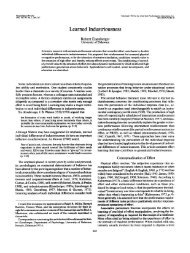Perceived Organizational Support
Perceived Organizational Support
Perceived Organizational Support
Create successful ePaper yourself
Turn your PDF publications into a flip-book with our unique Google optimized e-Paper software.
Coyle-ch10.qxd 1/16/04 3:00 PM Page 220<br />
220 Exchange Nature of Employment Relationship<br />
jobs because they desire these work arrangements. A college student working<br />
part-time to earn extra money would be designated a voluntary contingent<br />
employee. By contrast, involuntary contingent employees work on a part-time or<br />
temporary basis but desire regular employment. A new college graduate who takes<br />
a part-time job after failing to find regular work would be denoted an involuntary<br />
contingent employee. Because attaining regular employment is a salient need for<br />
involuntary contingent workers, they may attribute the organization’s failure to offer<br />
them regular employment as an indication of low valuation. This would be more<br />
likely if the organization were known to make use of contingent employees on a continuing<br />
basis. In such cases, it would be expected that involuntary contingent<br />
employees will tend to have lower levels of POS than voluntary contingent workers.<br />
Work status may also play a role in determining how contingent workers choose<br />
to reciprocate POS. Due to the brevity of their expected tenure with the organization,<br />
temporary employees may be less inclined than regular employees to volunteer for<br />
ambitious projects. Rather, temporary employees may be likely to repay the organization<br />
by working harder or more carefully in their in-role activities or by engaging in<br />
short-term ad hoc extra-role behaviors. Many voluntary part-time employees may<br />
have been drawn by the opportunity for more free time for their personal life. For<br />
these employees, activities outside of work, such as child-rearing or education, may<br />
take precedence over work. Therefore, part-time employees may be less inclined to<br />
volunteer for tasks that would impinge on their personal lives, such as overtime work<br />
assignments.<br />
10.6.5 Human resource practices<br />
POS has implications for the strategic human resources literature, which emphasizes<br />
the effects of an organization’s HR package on employee performance (Huselid et al.<br />
1997). Strategic HR investigators have concentrated on such practices as hiring<br />
from within versus from outside the organization, formal training programs,<br />
appraisal systems, profit sharing, employment security, opportunities for employees<br />
to voice their views, and scope of job responsibilities (Delery and Doty 1996).<br />
Delery and Doty (1996) noted that HR researchers have investigated the link between<br />
strategic HR practices and performance but have given little attention to possible<br />
mechanisms responsible for this relationship.<br />
While it is generally assumed that effective HR practices contribute to performance<br />
by enhancing employees’ knowledge, skills, and abilities (Schuler and<br />
Jackson 1987; Jackson and Schuler 1995), favorable strategic HR practices may also<br />
enhance performance by increasing POS. Investing in employees’ development and<br />
recognizing their contributions would indicate the organization’s positive valuation<br />
by the organization of employees’ contributions and its commitment to a strong<br />
employee–employer relationship, thereby enhancing POS. On the basis of the norm<br />
of reciprocity, POS would promote a heightened sense of obligation among employees<br />
to help meet the organization’s objectives. This increased obligation should result<br />
in greater work effort and heightened performance (Eisenberger et al. 1986;



